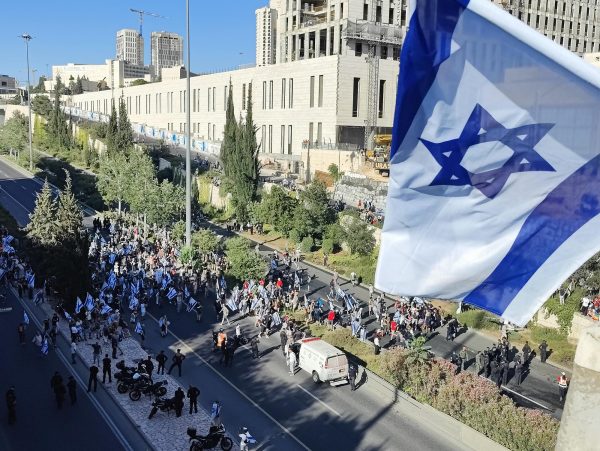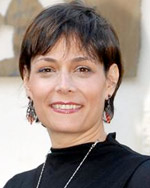By Leah Garber
This Thursday, the Jewish people will celebrate the ninth day of the Hebrew month of Av—a day of mourning for the destruction of the two Temples in Jerusalem, the last nearly 2,000 years ago.
The Second Temple was not destroyed as a result of external enemies, wars, or mighty threats, but rather for baseless hatred in the face of the disintegration of internal cohesion. The greatest Jewish symbol of all time was destroyed due to gratuitous hatred.
I am a sabra—born and raised in Israel. Throughout my life, I have cheered for my beloved country, sung its praises, and cried for its losses. I bow my head in honor of those who sacrificed their lives and am filled with pride knowing we are here together, sharing our hope for a glorious Jewish state.
Today, however, I feel a deep sadness—as never before—and a real concern for the continued social stability of my homeland.
The sense of togetherness has always been authentic, present, enveloping me in comfort. As in any society, political disputes, even acrimonious ones, have always been part of the delicate fabric of our lives in this country. Intense debates defined us, but never threatened our unity as they do now.
Today is a day to remember. Today the Israeli coalition government passed a key judicial law that revokes the Supreme Court’s authority to overturn government decisions it deems “unreasonable.” Our beloved Israel is undergoing an internal upheaval—the most significant, painful, and alarming it has known in its entire 75 years of existence. And I am devastated.
From the 12th floor of the Ramada Hotel in Jerusalem, where I am spending time with more than 800 teens participating in the JCC Maccabi Games® in Israel, I watch, with tear-filled eyes, as thousands of Israelis protest on the streets below. At one of the city’s main junctions, throngs of people wave Israeli flags, calling for a stop to the gallop of legal reform.
 In the midst of the educational travel component of the Games, the ongoing 75th-anniversary celebrations of Israel and Jewish peoplehood, I’m still basking in the glow of the powerful and moving b’nai mitzvah ceremony we held near the Western Wall on Friday and the joyful Havdalah ceremony the next night. I marvel at the Jewish unity and solidarity we have been celebrating with the teens. Meanwhile, within earshot, my fellow Israelis beg for dialogue and a return to our fundamental values—unity above all.
In the midst of the educational travel component of the Games, the ongoing 75th-anniversary celebrations of Israel and Jewish peoplehood, I’m still basking in the glow of the powerful and moving b’nai mitzvah ceremony we held near the Western Wall on Friday and the joyful Havdalah ceremony the next night. I marvel at the Jewish unity and solidarity we have been celebrating with the teens. Meanwhile, within earshot, my fellow Israelis beg for dialogue and a return to our fundamental values—unity above all.
Their chants drew me to the street.
Taking a break from the cheerful atmosphere of JCC Maccabi, I left the hotel and walked nearby to join my fellow citizens on the street. Feeling the urge to wave a flag, I asked a man to share his with me. For 30 minutes I stood shoulder to shoulder with thousands I did not know and with whom I was so close, waving the borrowed flag, crying, calling for democracy, and demonstrating a deep concern for the future of the country we all share.
Sadness and joy are woven into the fabric of our lives in an endless stream—tears of pain and tears of happiness.
This week, the Jewish people will mourn the destruction of the Temple, an everlasting symbol of unity and cohesion. Six days later, on the 15th of Av, we will celebrate Tu B’Av, originally a post-biblical day of joy and matchmaking for unmarried people in the Second Temple period.
A week separates the two: the first a day of mourning for the disintegration of unity, the second a joyous occasion marking the union between two people—and their declarations of intentions to establish a shared home, creation, renewal.
Israel needs more than a week to repair the terrible rift it is experiencing. It will take time to collect the pieces, bring them together with care and sensitivity, and truly see the endless opportunities that exist for unity, rebuilding, and strength.
We are not there yet, and the road is long.
Today I am in pain, sad, and worried for my home, but always looking ahead for better tomorrows, hopeful that days of healing and building will arrive. Waiting for Tu B’Av.
 Leah Garber is a senior vice president of JCC Association of North America and director of its Center for Israel Engagement in Jerusalem.
Leah Garber is a senior vice president of JCC Association of North America and director of its Center for Israel Engagement in Jerusalem.